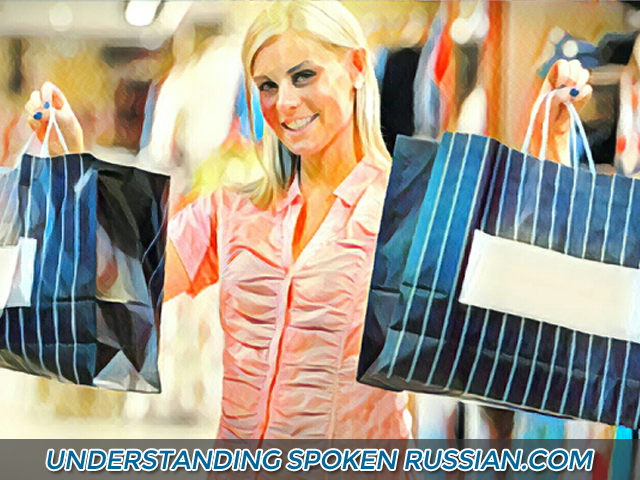
Full Episode Audio
Exercises Only Audio
Download Full Episode (right click save-as)
* NOTE *
All phrases intended for translating/listening practice have been deleted.
Welcome to Episode #3 of Understanding Spoken Russian. Let’s warm up by trying to name the gender of the words we hear—specifically the last word in each phrase. If you’re new to all this, you might be wondering…Wait, words have gender? And, yeah, they do. It’s pretty common in other languages, too. Anyway, here’s how it’ll work: If the last word ends with an “ah” sound, you’ll say feminine. Like this one….
If it ends with an “oh”…or really, an “oh-uh” sound, say neuter:
If it ends with a consonant, say masculine. Ready?
– – – Exercise Omitted– – – keep in mind this is a listening course, so putting the answers here so they can be read, defeats the purpose. If you have done the exercises but are having trouble and / or would like to see how things are written, mention the issue you are having in the comments and I’ll either post a reply or e-mail them to you directly. —
If you got most of those, you’ve got a good ear, and that’s going to serve you well. And getting back to this concept of gender, what’s really cool about Russian is—as we discovered in the last lesson—they apply it to verbs in the past tense. So, in this next exercise, tell me: Is the speaker talking about what a man did or what a woman did?
– – –
Hmm…Did you catch something odd about those last two? First we heard Саша купил…
and now it’s Саша купила…with an “a” at the end. How can that be? Well, the name Sasha is a nickname for guys named Alexander, and for women named Alexandra. It’s like the name Pat. Pat can be a guy or a girl. And what’s interesting is, if we heard similar English phrases, we wouldn’t know if Pat was a man or woman. Pat bought a car. We don’t know who Pat is. But in Russian, you do. Tell me, in this next one, is Sasha a guy or a girl?
купил…It’s a guy.
And I’d like купить to be our new word of this lesson.
To help you remember it, let’s imagine winning the lottery. What do we do first? Run out and buy a Mercedes Coupe. That sound…”coupe” (куп) is the root of the word.
So let’s work with it a bit. Can you translate the following phrases?
– – –
(re: the last example) First of all, is Sasha a guy or a girl? Саша купил…It’s a guy.
Next, what do you think вино is? As you probably guessed, it’s wine. And what’s the gender of that word? вино ends with an “oh-uh” sound, which makes it neuter. Next…
Notice that, even though Papa ends with an “a”, the verb ending “tells the truth.” The verb купил was in its masculine form because Papa, despite the “a” ending, is obviously male.
– – –
Next, what I’d really like to show you today is the importance of rhyming in Russian. Important is an understatement, really. Rhyming is the core principle behind the grammar of the language. And it’s what makes the language so beautiful. In essence, Russian is set up to be one big poem.
Here. Just listen. There’ll be two phrases. In the first one, our speaker will say: Wow, such a big and costly car.
In the next: Wow, such a big and costly airplane.
The English versions obviously don’t rhyme. But in Russian?
They can call it “adjective noun agreement” if they want. But my two year old daughter Sophia? She knows the words are just rhyming. Listen and compare. In English we might say, The food is fast and tasty! In Russian?
See how the adjectives быстрая and вкусная rhyme with еда?
In English, we’d say: A new, two-story school. I mean, does that rhyme? It does in Russian.
In English I might say: She’s a beautiful, smart dog. Does that rhyme? It does in Russian…
I mean, it can be anything…The long, yellow pen.
In Russian, the words for food, school, dog, pen, and thousands of others… they’re feminine.
And so their adjectives have to rhyme with them. That’s why we had all those “ya” sounds…
They’re rhyming with those feminine nouns.
How does this help us? Again, let’s look at how my daughter Sophia processes Russian. We were taking a walk this morning and saw our neighbor’s new BMW. In English, I might’ve said, “Man, that car…I bet it’s pretty expensive.”
Notice how ‘car’ and ‘expensive’ were separated from each other. To Sophia, it’s less clear that ‘expensive’ is describing the car. But if I’d mumbled the same thing in Russian…
Here, Sophia’s ears perk up. Because дорогая rhymes with машина…So she knows that дорогая is describing the машина. Even though the words were separated from each other.
So, in this exercise, see if you can spot the feminine noun and its adjective. For ex:
Еда там в ресторане очень вкусная.
Еда was the noun and вкусная was the adjective.
For now, let’s not bother with the meaning. Just listen for the noun and its adjective…
<<Tip of the day….>>
Today I’d like to answer a question I get from a lot of listeners, which is: How does this course differ from my Russian Made Easy podcast? And I think what they really want to know is: Is it okay to do both at the same time?
The answer is: Absolutely. And as I’ve done before, let me use my kids as an analogy.
I mentioned that during their first two years or so, our twins William and Sophia didn’t talk much. But once he approached his third birthday, William became all about communicating. Just like William, my Russian Made Easy podcast is totally focused on speaking the language. One thing William does constantly now, for example, is use constructions. If you haven’t heard the term, a construction is a phrase where you change out a word or two each time you repeat it, and they’re very powerful because they mold you into a fluent speaker. Here, listen to William using a construction in English…
In Russian Made Easy we work a lot with constructions because I want you to be able to express yourself, quickly and fluently.
This course, on the other hand, is more like William’s twin sister Sophia. She speaks a lot less than her brother but I think she understands things even better. If we’re watching, for example, Winnie the Pooh in Russian…
…and I hit pause and ask…”Okay, guys…Кому он купил шарик? — who did Piglet buy the balloon for?” Sophia will correctly say, “Winnie the Pooh.” Meanwhile, William ignores the question and launches into a construction: Я купил шарик…и Мама купила шарик…и София купила шарик и Андрюша купил шарик. He’s saying, I bought a balloon, and Mama bought a balloon, and so on. I’m sure he knew the answer, too, but he’s so focused on communicating, it’s all he wants to do.
I sometimes wish Sophia would speak a little more, but it’s okay. She’ll talk more when she feels comfortable. And therein lies today’s tip: Of course you can do both podcasts—they complement each other perfectly—but it’s okay to be like Sophia and stick with this course for a while, building up your ear and your confidence until you’re ready, like William to unleash your Russian on the world.
<< end tip >>
Next, let’s listen to some clips from youtube. Except for one, they’re all videos of women talking about what they bought, so we can listen for today’s new word. Here’s the first one. Can you spot where she bought these things?
Listen again…it comes right at the end.
She said: In this video I want to show you the things which I bought in second-hand.
The key phrase was: купила в секонд-хенде
Here’s another “shopper blogger” about to share what she bought…
She, too, is saying…..what I bought in second-hand. Remember, the basic form of the word is just:
секонд-хенд
But she bought it in second-hand and so she has to add that locational “yeh” ending.
Then she tugs at her T-shirt and says: I just understood, or “just realized” that I put on a white futbolka. Listen?
A futbolka (футболка) is a T-shirt, by the way. And did you spot those two past tense verbs, поняла…and…надела? Listen one more time..
This next lady will also tell us about…
…about her purchases in second-hand. And there’s that куп again…покупка is a purchase. Something that you bought
Then she gets down to business and busts out all her shopping bags…
Now I’ll show you guys what I bought. Listen again…
She says her viewers sometimes ask…
She said: How in general one can go to second-hand, and how you can buy something there.
Notice that, since she’s talking about GOING TO a second-hand store, it doesn’t get the “yeh” ending. And also notice our “COUP” sound in покупать…another form of the verb “to buy.”
In this last clip, a woman is telling a reporter about making money online. Can you translate her first four words?
She said: I was in shock…Я была в шоке
The whole thing was: “I was in shock when I sold, for real money, that is, that which I said to the camera.”
Three times she used the word “I”, followed by a past tense verb.
Я была…Я продала…я сказала
I was….I sold….I said….
– – –
Alright, here’s today’s final exam. Can you translate these phrases? Some of the words might be unfamiliar, but still…see if you can get the gist. And as always, if you hear a location without the “yeh” sound, we’ll assume the person is on their way there. Ready?
– – –
In the next lesson we’ll look at the forms of the word “my” in detail. And in the meantime, feel free to send me an email and let me know how you’re doing in this course. My email is mark (@) understandingspokenrussian (dot) com
See you in lesson 4!
Podcast: Play in new window | Download

